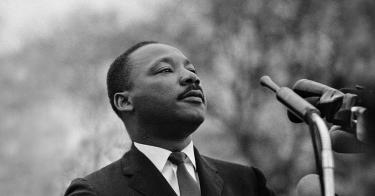Nearly 50 years ago, Martin Luther King Jr. delivered one of the greatest speeches in American history. Standing on the steps of the Lincoln Memorial before thousands assembled, King, with his characteristic vigor, shared his dream for America.
While we all know King‘s dream - breaking “the manacles of segregation and the chains of discrimination” to transform “the jangling discords of our nation into a beautiful symphony of brotherhood” - many seem to have forgotten its source. It was, he said, “a dream deeply rooted in the American dream,” one embedded in “the magnificent words of the Constitution and the Declaration of Independence.”
That adds a note of irony to the storm that broke out two weeks ago over the GOP-led reading of the Constitution in the House of Representatives. “Certainly the Republican leadership is not trying to suggest that African-Americans still be counted as three-fifths of a person,” opined the New York Times, highlighting the contempt many elites harbor for our founding documents.
It’s a tired refrain - the Founders were racists, the Declaration didn’t really mean all men, the Constitution is pro-slavery. It’s also a gross distortion of our history - as King well knew when he invoked the promise that “all men, yes, black men as well as white men, would be guaranteed the unalienable rights of life, liberty, and the pursuit of happiness” at the heart of the Founding.
The Constitution, contrary to what the New York Times would have you believe, does not classify people according to race. Free blacks in the North and the South were counted on par with whites for purposes of apportionment. As for enslaved blacks, it was the Southern states that wanted to count them as full persons, thereby inflating pro-slavery representation in the House. The three-fifths compromise was aimed at preventing Southern states from magnifying their own political power by holding slaves.
Yet this myth of a racist Founding has, unfortunately, become deeply entrenched in academia and among the chattering classes. It’s taught in high schools and colleges nationwide and has become unquestionable dogma for many.
Sadly, this pernicious tale fosters alienation and despair among those who most need to believe in the American dream. Armchair intellectuals may pontificate as they see fit at their East Hampton cocktail parties. But what hope can there be for blacks trapped in desolate inner cities and failing schools to lift themselves up from alienation and poverty if they are told that America has no place for them? Can anyone who believes that America is built on a foundation of racist ideas muster the courage necessary to solve the current black predicament?
If the Declaration of Independence and the Constitution are indeed racist documents, then King‘s faith in America will appear misplaced. We will be led, as he put it, “to wallow in the valley of despair.”
Instead, we should draw inspiration, not only from King, but also from that other great black believer in America: the 19th-century abolitionist and indefatigable advocate of civic and political equality, Frederick Douglass.
A former slave who escaped to liberty, Douglass initially sided with the abolitionists of the day in rejecting America and its Constitution “for supporting and perpetuating” slavery, “this monstrous system of injustice and blood.” Yet through a careful study of the Founding, Douglass learned to love and identify with his country. He understood that America’s grounding in the natural-rights teaching of the Declaration held the promise of justice for all, regardless of skin color.
Today, as we honor Martin Luther King, we have a moral duty to reaffirm the soundness of the principles of the American Founding. We must make the case, as forcefully as we can and as vigorously as he and Douglass did, for the integrationist faith in America. King‘s dream should embolden all of us who believe in America and her dedication - shaky at times, but eventually triumphant - to the equality of men.
First appeared in The Washington Times



